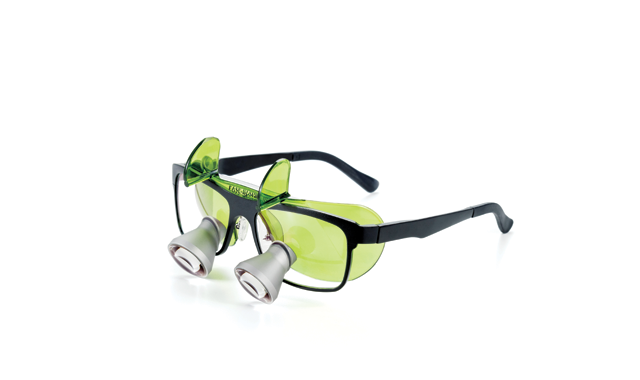'Laser eye protection in a single design'
A Q&A with Dr. Anthony Podrow, founder of Ease-In-Shields™, and Dr. Chris Owens, founder & CEO of Ease-In-Shields, on the Best of Class winner Ease-In-Shields.


×
Partner Perspectives allows marketers to connect directly with the DPR audience by enabling them to share their content. This content does not necessarily reflect the views of Dental Products Report editorial staff or UBM.
Learn more
Become a partner
What makes the Ease-In-Shields system so special?

We began our Ease-In-Shields design with more than 18 different iterations or combinations for small, medium and large face types being combined with flat, semi-curved or curved frames. Loupes are also available with flip-up or the more common through-the-lens telescopes. After lots of hard work and facial studies we were thrilled when we finally hit on the simple, elegant solution we have now. We turned our emphasis to the fit of Ease-In-Shields to the wearer’s face versus trying to match so many different types of loupe designs. Once we concentrated our focus to the interface between the face and our product, we could design one shape that fits over 98 percent of faces and loupe combinations. Our idea was to simplify laser eye protection, making it easier for our colleagues to do the right thing and protect their eyesight. Being able to buy one pair of Ease-In-Shields no matter what style of loupes you own creates a universal fit for the vast majority of users. By combining our Universal Fit with one of our three broad spectrum filter options, Universal Soft Tissue, Universal Hard Tissue or Curing Light, we’re able to offer eye protection for almost every dental laser on the market.
Read more: Orascoptic introduces headlight with 24 hours of illumination
Why do you think this product won the Cellerant 2017 Best of Class Award?
Because of their simplicity and ease of use; and [because of] the incredible reaction of everyone who has seen and tried our product! I cannot explain how fun and exciting it’s been to see eyes “pop open” and excitement build whenever we show the product. The universality of fit and function have made a product that is much easier to use than past options.
What do you think it has provided to the industry that other protection solutions have not?
Ease-In-Shields have provided laser eye protection in a single design that fits all brands, sizes and shapes of loupes, eyewear and face types in an incredible way. Ease-In-Shields don't interfere with headlights or telescopes and the protection they provide is unprecedented!
Ease-In-Shields are lighter, have anti-scratch and anti-fog coating while the simpler design lends itself to being more hygienic than past designs. Ease-In-Shields are far quicker and easier to use, more stable, comfortable and provide more coverage than competing products, addressing a need that’s been voiced for a long time.
What has been the user experience with Ease-In-Shields?
Our user experience has been a series of surprised compliments with people wondering how “such a simple shape could work so remarkably well.” We often hear, “How soon can I get my set?” We’ve also experienced several people who have excitedly recommended a large variety of “other uses” that our design would “be perfect for,” and we’re exploring many of those areas too.
How do Ease-in-Shields provide improved safety and security for the dental professional?
Ease-In-Shields provide improved safety and security in that there is virtually not a single area where laser light can “sneak in” to damage your eyes. Our patented design insures your full protection in every area and from every angle. We gave special attention to protecting the nasal opening, medial, lateral, inferior and superior borders where “stray” reflected light energy could cause significant and life-changing eye damage. Some products on the market for use with loupes provide much less coverage and thus less protection! We also provide optional, clip-on elastic head-straps which assure your complete protection even if your loupes are ill-fitting; or if you don’t wear loupes, wear some other kind of eyewear or no eyewear at all!
How does it change and improve the dental workflow?
[The] dental workflow with Ease-In-Shields is revolutionized in that it only takes a few seconds to easily and comfortably place or remove Ease-In-Shields on almost all types of loupes or conventional eyewear! Magnification loupes or other eyewear are not removed for placement or removal, and positioning is foolproof. This also means you no longer must remove and replace your gloves to retain sterility, as insertion and removal are accomplished by touching only a single (wipeable) “grasping tab.” Ease-In-Shields are also stable once in place, whereas some laser filter “inserts” tend to spring off or become easily dislodged. These features save time, money and frustration every time you use your laser.
Trending article: A look at the 2017 Cellerant ‘Best of Class’ Technology Award winners
What is one thing you really want everyone to know about Ease-In-Shields?
It seems that until now, there has not been a good solution to the significant problem of how to comprehensively protect your eyesight if you wear magnification loupes and use a laser; and in fact, this is one of the principle questions that has arisen at many of the laser courses I’ve taught. My own dissatisfaction with the other attempted solutions is what prompted us to create our product in the first place.
It is disturbing how many colleagues we have spoken to who don’t use eye protection for the reasons given above; they find other options “useless,” “ineffective,” “cumbersome,” “frustrating,” “time-consuming,” “uncomfortable” and the list goes on! What we would want colleagues to know is the incredible importance of NOT risking your eyesight (not to mention your livelihood); now with Ease-In-Shields there’s an easily available and viable solution we’re sure you’re going to love.
Anything else you'd like to add?
Thank you for the opportunity to share Ease-In-Shields with our colleagues.
ACTIVA BioACTIVE Bulk Flow Marks Pulpdent’s First Major Product Release in 4 Years
December 12th 2024Next-generation bulk-fill dental restorative raises the standard of care for bulk-fill procedures by providing natural remineralization support, while also overcoming current bulk-fill limitations.